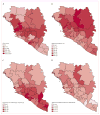Malaria morbidity and mortality in Ebola-affected countries caused by decreased health-care capacity, and the potential effect of mitigation strategies: a modelling analysis
- PMID: 25921597
- PMCID: PMC4824180
- DOI: 10.1016/S1473-3099(15)70124-6
Malaria morbidity and mortality in Ebola-affected countries caused by decreased health-care capacity, and the potential effect of mitigation strategies: a modelling analysis
Abstract
Background: The ongoing Ebola epidemic in parts of west Africa largely overwhelmed health-care systems in 2014, making adequate care for malaria impossible and threatening the gains in malaria control achieved over the past decade. We quantified this additional indirect burden of Ebola virus disease.
Methods: We estimated the number of cases and deaths from malaria in Guinea, Liberia, and Sierra Leone from Demographic and Health Surveys data for malaria prevalence and coverage of malaria interventions before the Ebola outbreak. We then removed the effect of treatment and hospital care to estimate additional cases and deaths from malaria caused by reduced health-care capacity and potential disruption of delivery of insecticide-treated bednets. We modelled the potential effect of emergency mass drug administration in affected areas on malaria cases and health-care demand.
Findings: If malaria care ceased as a result of the Ebola epidemic, untreated cases of malaria would have increased by 45% (95% credible interval 43-49) in Guinea, 88% (83-93) in Sierra Leone, and 140% (135-147) in Liberia in 2014. This increase is equivalent to 3·5 million (95% credible interval 2·6 million to 4·9 million) additional untreated cases, with 10,900 (5700-21,400) additional malaria-attributable deaths. Mass drug administration and distribution of insecticide-treated bednets timed to coincide with the 2015 malaria transmission season could largely mitigate the effect of Ebola virus disease on malaria.
Interpretation: These findings suggest that untreated malaria cases as a result of reduced health-care capacity probably contributed substantially to the morbidity caused by the Ebola crisis. Mass drug administration can be an effective means to mitigate this burden and reduce the number of non-Ebola fever cases within health systems.
Funding: UK Medical Research Council, UK Department for International Development, Bill & Melinda Gates Foundation.
Copyright © 2015 Walker et al. Open Access article distributed under the terms of CC BY. Published by Elsevier Ltd.. All rights reserved.
Conflict of interest statement
We declare no competing interests.
Figures




Comment in
-
Ebola: the hidden toll.Lancet Infect Dis. 2015 Jul;15(7):756-7. doi: 10.1016/S1473-3099(15)70167-2. Epub 2015 Apr 23. Lancet Infect Dis. 2015. PMID: 25921598 Free PMC article.
References
-
- WHO. [accessed Dec 1, 2014];Ebola data and statistics. http://apps.who.int/gho/data/node.ebola-sitrep.quick-downloads?lang=en.
-
- WHO Global Malaria Programme. [accessed March 31, 2015];Guidance on temporary malaria control measures in Ebola-affected countries. http://apps.who.int/iris/bitstream/10665/141493/1/WHO_HTM_GMP_2014.10_en....
-
- Check Hayden E. Ebola obstructs malaria control. Nature. 2014;514:15–16. - PubMed
-
- UNICEF. [accessed Dec 8, 2014];Sierra Leone: in communities at risk, the fight against Ebola and malaria goes hand in hand. http://www.unicef.org/media/media_78045.html.
Publication types
MeSH terms
Grants and funding
LinkOut - more resources
Full Text Sources
Medical
Miscellaneous

